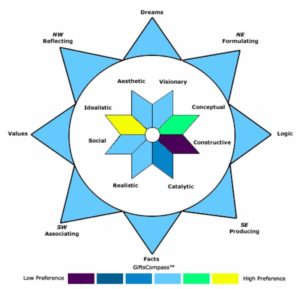“Although the unconscious thinking is archaic, its reductive tendencies help to compensate the occasional fits of trying to exalt the ego into the subject.” – C.G. Jung
In this article, Jungian analyst Vanessa Prins-Goodman reviews extraverted thinking in the “inferior” or “shadow” position. This article, and the ones that follow, offer glimpses of a more complete article or book that will be the outcome of a small study group currently researching each of the types in the shadow.
Constructive Thinking
Extraverted thinking in the conscious position enables a person to put order in the many facts of the outside world, using logical thinking. A person favoring extraverted thinking will often enjoy collecting many detailed facts and data. Extraverted thinking can analyze and order a vast array of facts, deriving order according to rational, reductive “ruling formulas.”
Accountants, managers, physicians, lawyers or judges could exemplify people who regularly exercise extraverted thinking. Many of the tasks in business environments often require extraverted thinking.
 Extraverted Thinking in the Shadow
Extraverted Thinking in the Shadow
When extraverted thinking is in the “inferior” or “shadow” position, it is much less accessible to consciousness. The capacity to apply logical order to outer reality tends to be undeveloped or unreliable.
A person might find it difficult to create order, to make decisions based on facts, or work skillfully with practical problem-solving. He might easily feel overwhelmed by facts and numbers, or at a loss to cope with them. Applying this kind of thinking can feel uncomfortable, boring, or draining. He might postpone administrative duties, failing to organize or make sense of those tasks . . . or might even try to avoid them altogether.
For example, a feeling oriented person might want to buy a house. It is easy for him to know which houses he likes best, he knows how he feels about them. But the decision-making may also require comparing important facts (price, number of rooms, location). The process of comparing those facts might soon become tedious; he may encounter frustrating obstacles (e.g. he doesn’t know how to use an Excel spreadsheet). He might feel discouraged by all of the necessary thinking. Abandoning the logical consideration of facts, he might just make his decision based on what feels good.
Extraverted thinking in the shadow, though less developed, serves to compensate for or oppose the best-developed types in ego consciousness, thus inhibiting ego inflation.
“Although the unconscious thinking is archaic, its reductive tendencies help to compensate the occasional fits of trying to exalt the ego into the subject.” (CW 6, par. 643)
The type theoretically dominant in ego consciousness would be introverted feeling, but introverted intuition or introverted sensation are often dominant when extraverted thinking is lodged in the “unconscious” shadow.
We can see archaic extraverted thinking in Vincent van Gogh, who likely favoured introverted sensation as a lead type. In his articles to his brother Theo, one can hear introverted sensation in his vivid description of nature and the painting he has been working on:
“Yesterday, at sunset, I was on a stony heath where very small, twisted oaks grow, in the background a ruin on the hill, and wheat fields in the valley . . . The sun was pouring its very yellow rays over the bushes and the ground, absolutely a shower of gold.” (Letter 636)
He also writes about his health problems, emotional turmoil, and troubled financial situation, which frequently concerned him. In one of those articles, we can hear his resistance to the administrative detail that would enable him to order his finances.
“It’s to my astonishment that I can already see the bottom of my wallet; it’s true that I had my month’s rent to pay. You must clearly know that if I deduct food and lodging, all the rest of my money still runs away on canvases.” (Letter 636)
And so too, practical organization of daily tasks can “run away” as extraverted thinking remains firmly entrenched as an archaic type.
In the next issue, we will review extraverted thinking as a shadow projection and as destructive opposition to extreme one-sidedness.
Vanessa Goodman
4/1/2015
